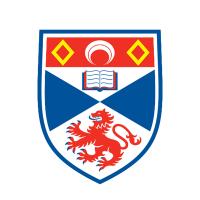IMACS: International Master in Audiovisual and Cinema Studies (MLitt)
This two-year MLitt degree offers a unique opportunity to gain comprehensive training in film and media studies while participating in a network of 15 leading programmes in Europe and Canada.
Students enrolled in the programme spend two semesters at St Andrews, and the remaining two semesters at partner institutions.
Intakes
- Sep
Application Processing Time in Days: 14
Minimum English Language Requirements
| English Level Description | IELTS (1.0 -9.0) | TOEFL IBT (0-120) | TOEFL CBT (0-300) | PTE (10-90) | |
|---|---|---|---|---|---|
| Expert | 9 | 120 | 297-300 | 86-90 | |
| Very Good | 8.5 | 115-119 | 280-293 | 83-86 | |
| Very Good | 8 | 110-114 | 270-280 | 79-83 | |
| Good | 7.5 | 102-109 | 253-267 | 73-79 | |
| Good | 7 | 94-101 | 240-253 | 65-73 | |
| Competent | 6.5 | 79-93 | 213-233 | 58-65 | |
| Competent | 6 | 60-78 | 170-210 | 50-58 | |
| Modest | 5.5 | 46-59 | 133-210 | 43-50 | |
| Modest | 5 | 35-45 | 107-133 | 36-43 | |
| Limited | 4 | 32-34 | 97-103 | 30-36 | |
| Extremely Limited | < 4 | < 31 | < 93 | < 30 |
Job Opportunity Potential
With so many options to choose from, planning your career can sometimes be challenging. The advice on this page will help you break down your career planning into four steps, to make starting the process easier.
1. Develop your self-awareness
Knowing yourself is a key part of the career planning process. Understanding your character and personality will help you choose a role that will make you happy and fulfilled. However, these are not fixed – you’ll develop new skills and learn more about yourself during your time at St Andrews, and throughout any future career.
You should consider what is important to you, such as:
the type of work you enjoy, find most rewarding and do best at
work-life balance
the size of organisation you would like to work for
the importance of job security and location
company culture, including its corporate values
the kinds of people you would like to work with.
You should also consider any obstacles, such as disability or health issues, disappointing exam results, mobility, family responsibilities or any other relevant factors.
To help you develop your self-awareness, consider the following resources:
Prospects Career Planner – provides an easy way to analyse your skills, motivations, and desires, then compares them against a database of over 400 graduate job profiles, offering suggestions for further exploration.
16Personalities – offers a description of who you are and why you do things the way you do.
O*NET Interest Profiler – helps you work out what your interests are and how they relate to the world of work.
VIA Strengths Survey - provides a wealth of information to help you understand your character strengths.
You may also find some career planning books helpful. In particular, What Color is Your Parachute? by Richard Nelson Bolles is a useful resource for further developing your self-awareness. It is available from the Main Library.
2. Build your opportunity awareness
This stage involves exploring different occupations and employment sectors to find out which ones might suit you. You can achieve this in three main ways:
research
talking to others already in similar roles
gaining work experience (including unpaid experience and internships) of the occupations that most interest you.
To help you do this, consider the following resources:
A list of career sectors popular with University of St Andrews students.
The jobs and internships pages - information about how to find work experience and internships, including schemes sponsored by the Careers Centre.
Prospects job profiles - profiles to help you understand what's involved in over 400 graduate roles.
Connecting with alumni on LinkedIn and SaintConnect to see what you can learn from reading about other St Andrews graduates’ career paths. See the make a connection pages for further information.
If you want to study your subject at a more advanced level, further study might interest you. Further study could also be necessary or advantageous to pursuing a specific career. For more information, see the further study pages.
3. Prioritise occupations and make decisions
This stage involves more in-depth research. You should consider the benefits and disadvantages of your shortlisted occupations to help you decide which to pursue further.
You should search for vacancies in your shortlisted occupations, and consider things like:
How well do the jobs meet the requirements that you explored in step 1?
How interesting are the job descriptions?
How many vacancies are there in the locations you would like to work in?
How can you address any job requirements you don’t meet?
Is postgraduate study necessary?
As in step 2, you should also consider connecting with alumni and others using LinkedIn and SaintConnect, asking them about their experiences of your shortlisted occupations.
Gaining work experience can also be a useful way of seeing whether a career is worth pursuing at this stage. For help with finding work experience, see the jobs pages.
4. Transition into further study or work
Once you have followed the previous steps, you may be ready to create an action plan to set out in detail how you will move into your preferred career or course of further study. For help with how to do this, see jobs.ac.uk’s 5 Minute Career Action Plan.
You should also give yourself time to develop the skills necessary to perform well in applications and interviews. For advice on interviews, CVs, assessment centres and more, see the applying for a job or internship pages, and develop skills desired by employers through the Professional Skills Curriculum.
PSW Opportunity
- 2 Years Post Study Work Visa
Admission Requirement / Eligibility Criteria
Postgraduate candidates will be expected to hold a good second division (2.1) or first division UK Bachelor's degree with Honours, or the overseas equivalent, in a relevant subject, or a relevant postgraduate qualification.
Typical Indian degree equivalents with first-class grades of 60% to 80% (minimum) or 7.0-9.0 CGPA, depending on the institution attended, include:
Bachelor of Commerce (B.Com/BComm/B.Comm.) or Bachelor of Commerce and Administration (BCA) awarded from a recognised Higher Education, Professional or Specialist institution.
Bachelor of Engineering/Technology, when awarded from an institute of national importance, centre of advanced study, an Indian Institute of Technology (IIT), or the Indian Institute of Science in Bangalore.
Bachelor of Science Engineering/Engineering/Technology, when awarded from a central university, a recognised state university, or a regional Engineering college.
Indian Institute of Engineers examinations A and B.
Profile 1-D (Direct entry)
Cambridge English Qualifications
200
200
IELTS (Academic)
8.0
Profile 7-D (Direct entry)
Cambridge English Qualifications
169
176
IELTS (Academic)
6.0
6.5
Profile 4-D (Direct entry)
Cambridge English Qualifications
Listening: 169
Reading: 169
Speaking: 169
Writing: 185
185
IELTS (Academic)
Listening: 6.0
Reading: 6.0
Speaking: 6.0
Writing: 7.0
7.0
Profile 5-D (Direct entry)
Cambridge English Qualifications
169
185
IELTS (Academic)
6.0
7.0
Profile 6-D (Direct entry)
Cambridge English Qualifications
Listening: 169
Reading: 169
Writing: 176
Speaking: 169
176
IELTS (Academic)
Listening: 6.0
Reading: 6.0
Writing: 6.5
Speaking: 6.0
6.5
- Course Type: Full Time
- Course Level: Masters/PG Degree
- Duration: 02 Year
-
Total Tuition Fee:
78420 GBP
Annual Cost of Living: 9207 GBP
Application Fee: 75 GBP
Similar Programs
- MSt (Res) Social anthropology at University of St Andrews
- MSt (Res) Persian at University of St Andrews
- MSt(Res) Interdisciplinary studies at University of St Andrews
- MSc(Res) Interdisciplinary studies at University of St Andrews
- MSt(Res) History at University of St Andrews
- MSt (Res) Geography at University of St Andrews

